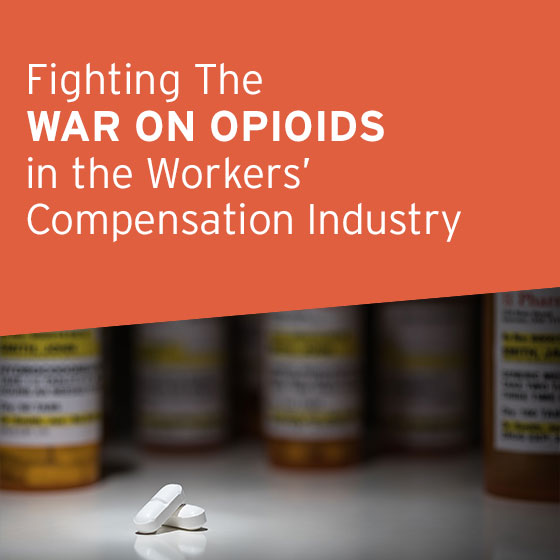Combating Opioid Abuse in Workers’ Compensation
The misuse and abuse of opioids is not a new problem facing the Workers’ Compensation industry. Due to the nature of the Workers’ Compensation industry, the treatment of pain in an injured worker is an issue that is dealt with on a daily basis. Lately, opioid misuse and abuse has been in the spotlight, both nationwide and in the Workers’ Compensation arena, due to new guidelines for opioid prescribing and continual increases in opioid abuse and overdoses. In 2014, over 14,000 people died due to an overdose of prescription opioids and it is estimated that 1 in 4 people prescribed long term opioids will struggle with addiction (CDC, 2016). Carlisle Medical, Inc. recognizes these issues and as a PBM understands that we have a role to play in decreasing opioid abuse and misuse.Pain due to a work related injury is a common complaint of an injured worker. Chronic pain is typically defined as pain lasting longer than three months (this may vary from 30 to 90 days depending on source) that persists beyond the anticipated time of healing. Opioids have long been a staple in treating chronic pain patients but more evidence is showing long term opioid use can be more harmful than beneficial. Evidence shows short-term (>12 weeks) use of opioids can decrease pain and improve function, but long term benefits start to decline with increased use and the potential for addiction and physical dependence increase substantially (CDC, 2016). The issue in Workers’ Compensation then becomes: how do we balance a patient’s need for pain relief versus the risk of developing an addiction?
All members of a patient’s medical team have a corresponding responsibility to their patients to provide treatment that will increase the patient’s functionality and quality of life while limiting the risk of misuse and abuse of medications. There are several ways each team member can screen and watch for the signs of opioid abuse and misuse in their own settings. As a PBM, Carlisle Medical, Inc. has a corresponding responsibility to help combat opioid misuse and abuse whenever possible.
Some of the many red flags of drug abuse are early fills and pharmacy and doctor shopping. Carlisle Medical can request prior authorizations for unapproved physicians or opioid quantities that are outside of the patient’s normal filling activity. If Carlisle Medical is notified of a prescriber who has lost a license or control substance registration, we can remove them from our approved physician list. We also monitor how early a claimant can refill any prescription. Multiple early refill requests can be seen as a sign of abuse and the adjuster can be alerted that this claimant may need to be screened for possible misuse. A claimant can also be locked into one pharmacy so that all pain medications are filled together to prevent early refills being sought at separate pharmacies. Formulary controls can be used to decrease the use of high dose opioids or those with an increased risk of overdose (such as extended release formulas) without proper protocols to ensure the claimant’s risk of overdose is decreased. Nurse case managers are also a great tool that Carlisle Medical utilizes to monitor a claimant’s medications. A NCM can alert an adjuster or physician if a claimant begins to exhibit aberrant behavior or notice if continuous increases in opioid doses are aiding in the patient’s functionality.
At Carlisle Medical’s Home Delivery Pharmacy, the following procedures can aid in recognizing or deterring prescription drug abuse. Claimants can be screened by pharmacy staff using state Prescription Drug Monitoring Program databases (PDMP). These databases allow prescribers and dispensers to monitor an injured worker’s controlled prescriptions. If a claimant is filling at multiple pharmacies or doctor shopping, the pharmacy can alert the physician and adjuster so appropriate steps can be taken to address the abuse. Claimants with a high MME (Morphine Milligram Equivalent) can be flagged for a Prescription Review or DUR (Drug Utilization Review) for appropriateness of current opioid doses. At Carlisle Medical Pharmacy, we encourage the use of e-scribing for all control substances. Electronic prescribing, or e-scribing, is the process of a prescriber transmitting a prescription directly to a pharmacy through a secure network. E-scribing decreases the risk of forgery or fraudulent prescriptions as well as pharmacy shopping. Since the physician sends the prescription directly to the pharmacy, the patient is unable to take his prescription to a new pharmacy for an early fill. Although completely preventing opioid abuse may be impossible, we at Carlisle Medical, Inc. try our best to put protocols in place to recognize and deter prescription drug abuse and misuse as early as possible.
Source: CDC Guideline for Prescribing Opioids for Chronic Pain. March 16, 2016. Centers for Disease Control and Prevention, National Center for Injury Prevention and Control, Division ofUnintentional Injury Prevention, U.S. Department of Health & Human Services. Accessed at: http://www.cdc.gov/drugoverdose/prescribing/guideline.html

